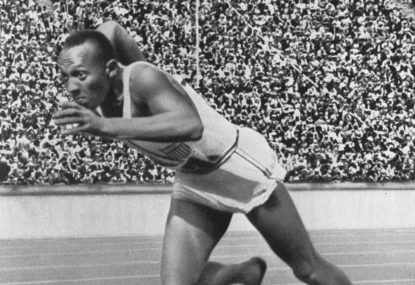'An iconic roster': LeBron, Steph, KD headline all-star cast for Team USA's shot at Olympic glory
LeBron James is going back to the Olympics for the first time in 12 years. Steph Curry is headed to the games for the…

Getting closer to the Olympics, let me address a different, though not entirely unrelated issue – Politics in Olympics.
Ideally sports and politics should be kept separate, but they’re inseparable. The Olympics, the largest multi-sports event on Earth, is no different.
My memory goes back to the year 1936, probably the first instance in modern day Olympics, when the most vulgar use of the mega sporting event for political purposes was made, in a very conspicuous way.
In that edition of Olympics held in Berlin, the German Führer Adolf Hitler, fueled by the propaganda machine of Joseph Goebbels, made the most flagrant political showcase of Nazism.
It was the first televised Olympics event. Goebbels understood the power of visual media and made full use of it. The controversial crooked cross Swastikas were everywhere, so also the incendiary slogans in Olympics village.
Politics led to war and war led to the cancellation of the subsequent Olympics of 1940 and 44. The London Olympics of 1948, held after a hiatus of 12 years, wasn’t free from politics either. Germany and Japan paid the price for being on the losing side of the second world war – they weren’t invited.
The nascent state of Israel wasn’t invited for political reasons, though soon the Blue Star state would become the blue-eyed boy of the superpower United States and very much at the center of attention in a later Olympics.
The domestic politics of this superpower spilled over to 1968 Olympics, in the form of the famous Black Power salute by two of its African American Athletes. IOC banned them both as well as the Australian athlete who supported them, stripping them of their medals.
1972, Munich was politically the bloodiest Olympics. The Palestinian terror group Black September kidnapped a dozen Israeli athletes from the Olympics village. A botched up attempt by German security forces to rescue them resulted in the death of the Israelis. Golda Meir, the then Prime minister of the Jewish state ordered the hunting down and killing of the perpetrators, which Mossad, their secret service, carried out in a spectacular fashion in subsequent years.
1976 Olympics in Montreal was a rare, politics-free Olympics. Well almost, for Ethiopia boycotted that Olympics, preventing its star long distance runners, especially the legendary Miruts Yifter, from participating.
The lull didn’t last long. Less than a year prior to the Moscow Olympics in 1980, Russian tanks rolled into Afghanistan. At the height of the cold war, a US-led boycott had a major impact on the Olympics. The boycott of many major sporting powers came as a blessing for India, in the form of a medal (gold) in Hockey, the only time it has won in that sport in the last 50 years.
In the year 1984, it was the Soviet Union’s turn as Moscow led communist nations retaliated by boycotting the LA Olympics held in US. Yet for the first time in history, profit from selling of TV rights and Corporate management made the organising Olympics look like a lucrative venture. 1984 was the year China came back to the Olympics, from which it was debarred to participate for decades, again due to political reasons.
Seoul Olympics in 1988 was the first boycott-free Olympics after a while, except those staunch, remaining Communist nations of North Korea (obviously) and Cuba (still uncomfortable with Gorbachev’s policy of Glasnost and Perestroika).
Just a year later, in the year 1989, IOC convened to decide the venue for 1996 Olympics. Being the centenary year, it was taken for granted that Athens, Greece, the host of the first modern day Olympics in 1896, would be granted as the venue. But powered by Coca-Cola and American power of influence, Atlanta squeezed ahead of Athens, amidst disappointment from Greece.
Fast forward to 1993, when Beijing was narrowly defeated by Sydney as the venue of the Y2K (2000) Olympics. Beijing whined a lot, openly blaming United States for scuttling its chances by raising human rights issue during the final rounds of voting.
Politics still remains very much part and parcel of sporting events. In an ideal world sports should be above politics. But unfortunately, we don’t live in an ideal world.